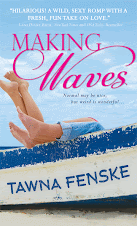
I’ll warn you now, I'm going to break yesterday’s rule on keeping posts under 500 words.
But it’s perhaps the most important topic I want to cover in my week of blogging about blogs, so bear with me.
One aspect of the blogiverse I didn’t grasp six months ago is the social side of things. In the last six months, I’ve learned a lot. Some good things, some bad things, and some things that make me want to slap myself in the forehead with a celery stalk.
Allow me to share:
A comment on comments
Six months ago, I’d read plenty of blogs. I had even commented on some, and seen blog authors reply back in the comment trail.
What I’d never grasped is how much that matters – maybe more than the content of the blog posts themselves.
From the start, I tried to reply to anyone who left a comment on my blog. I didn’t know at first if it made a difference, but when people began emailing to say how much they appreciated it, I knew it was the right thing to do.
A lot of people mistakenly think of blogs as the author standing on a soapbox shouting words of silliness or wisdom at loyal readers, but the true beauty of a blog – at least the sort of blog I want to have – is what happens after the post goes up. The discussion in the comments, the back-and-forth volley of ideas and dirty jokes – that’s every bit as important as what I write each day.
I didn’t know that six months ago. Now I do.
Are you following along?
See that little follower widget on the side of the page? Until Blogger asked if I wanted one, I’d never noticed them on other blogs. I had never “followed” a blog, and never noticed who followed the blogs I read.
Once I started noticing it, the concept seemed simple enough. I would read a blog I liked, click “follow,” and we’re all friends, right?
Sort of. My wake up call came a couple months later when I got a private message. The gist of it was this:
I’m unfollowing your blog because you aren’t following mine.
Wait – what?
I naively assumed “following” was about which blogs you like to read and want to keep tabs on. While that’s true to some degree, there’s a social side I hadn’t anticipated. An element of
I’ll scratch your back, you scratch mine, and if something changes, we scratch each other’s eyes out.
I don’t like that.
Look, I do my damndest to visit the blogs of people who comment here. It’s not because I “owe” you, but because you’re part of my circle of friends and I like knowing what my friends are up to. I may or may not comment, I may or may not remember to click “follow.” I may go for months without visiting someone’s blog (if it’s yours, I’m sorry – please raise your hand in the comments so I can stop by).
I’m uncomfortable with this idea that Jane will only read Susie’s blog if Susie reads Jane’s blog. I'm uncomfortable with the idea that there's a retaliatory element in play.
Maybe I’m naïve in hoping people come here because they’re interested in what I say. Hell, maybe half of you are here because you secretly hope
my amazing agent will notice you (she rocks, so I don’t blame you, but still). Maybe I should just shut up and play the game.
But the fact that there is a game? That surprised me. And I don’t like surprises.
The numbers don’t add up
Anyone want to guess which of my blog posts had the most readers in the last three months?
If you judged by the number of comments, you’d assume it’s the July 26 post titled
Are you calling my name?, which got close to 50 comments.
But that didn’t even make the top 10.
My most visited post in the last three months was the June 22 one titled
How not to be an email goober. It got almost 400 more visitors than the name one, yet it had fewer comments – 39, to be exact.
The second most viewed post was
The monkey business of social media, which had double the number of hits as the name one, but generated 20 fewer comments.
What gives?
For starters, the email goober post and the monkey one were tweeted and blogged about by others who were either amused, disturbed, or some combination of the two.
But the
name post or
What writers put in their mouths generated lots of comments because they invited readers to share simple, fun facts about themselves.
There are a few lessons in this experiment, but here’s one for new bloggers: if people aren’t commenting, don’t assume they aren’t reading. Download a tool like Google Analytics and check it out for yourself. You may be surprised.
And if you want comments, try sprinkling your posts with questions that prompt readers to share their own ideas and experiences.
Speaking of comments, I’d love to hear yours on the social aspect of blogging. Is there anything I missed? Any secret handshakes I haven’t learned? Tell me now so I can start practicing for the one-year blogiversary.
I’m a slow learner.









































